Ford Transit Transporter vs Mercedes EQV – Differences & prices compared
Compare performance, boot space, consumption and price in one view.
Find out now: which car is the better choice for you – Ford Transit Transporter or Mercedes EQV?
The Ford Transit Transporter (Cargo Van) comes with a Diesel or Electric engine and Manuel or Automatic transmission. In comparison, the Mercedes EQV (Bus) features a Electric engine with Automatic transmission.
When it comes to boot capacity, the Ford Transit Transporter offers , while the Mercedes EQV provides 1410 L – depending on how much space you need. If you’re looking for more power, decide whether the 269 HP of the Ford Transit Transporter or the 204 HP of the Mercedes EQV suits your needs better.
In terms of consumption, the values are 21.30 kWh7.90 L per 100 km for the Ford Transit Transporter, and 27.10 kWh for the Mercedes EQV.
Price-wise, the Ford Transit Transporter starts at 39900 £, while the Mercedes EQV is available from 51300 £. Compare all the details and find out which model fits your lifestyle best!
Ford Transit Transporter
The Ford Transit Transporter has long been a staple in the commercial vehicle sector, renowned for its reliability and versatility. It offers a comfortable cabin with a modern design that enhances the driving experience, making long journeys more enjoyable. With a focus on practicality, the Transit provides ample cargo space, meeting the demands of businesses and individual users alike.
details @ media.ford.com
@ media.ford.com
 @ media.ford.com
@ media.ford.com
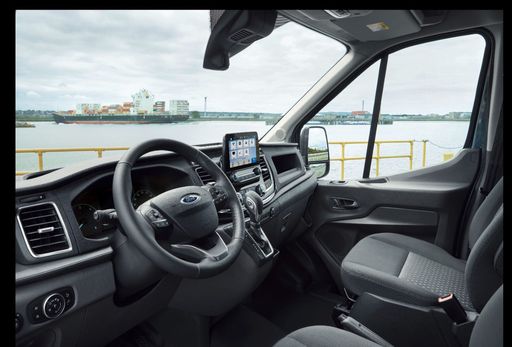 @ media.ford.com
@ media.ford.com
Mercedes EQV
The Mercedes-Benz EQV stands out as a versatile electric vehicle combining luxury with practicality, making it an ideal choice for environmentally conscious families. With its spacious interior and sleek design, it offers a premium driving experience that aligns with the brand's reputation for quality and innovation. As a sustainable option in the realm of people carriers, it exhibits the perfect balance between cutting-edge technology and everyday usability.
details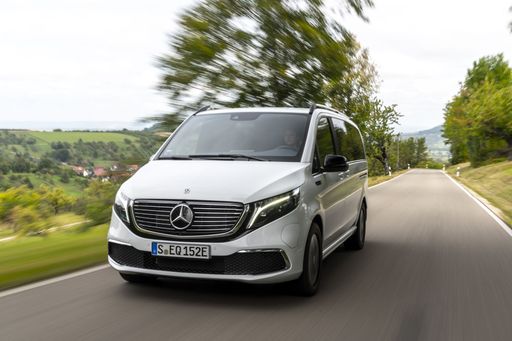 @ group-media.mercedes-benz.com
@ group-media.mercedes-benz.com
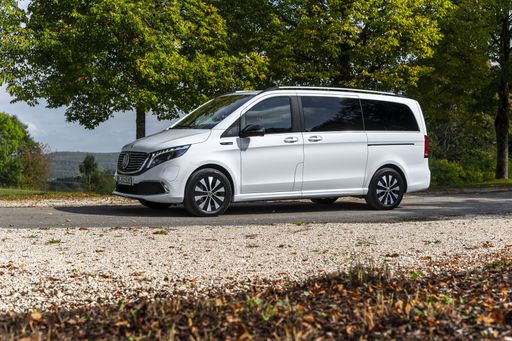 @ group-media.mercedes-benz.com
@ group-media.mercedes-benz.com
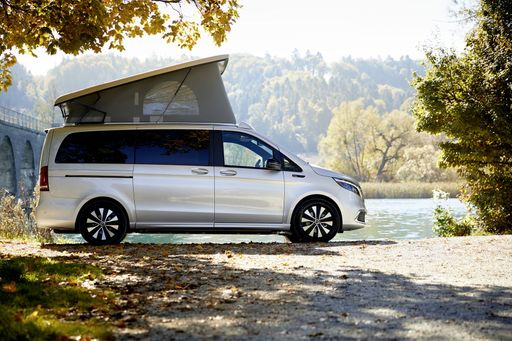 @ group-media.mercedes-benz.com
@ group-media.mercedes-benz.com
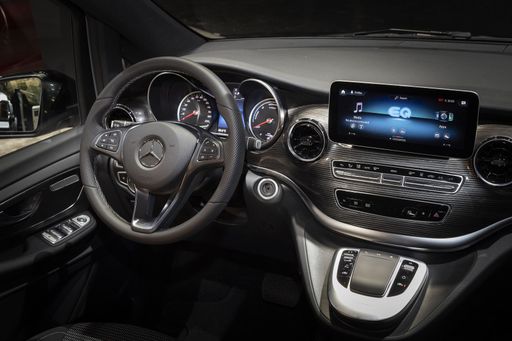 @ group-media.mercedes-benz.com
@ group-media.mercedes-benz.com
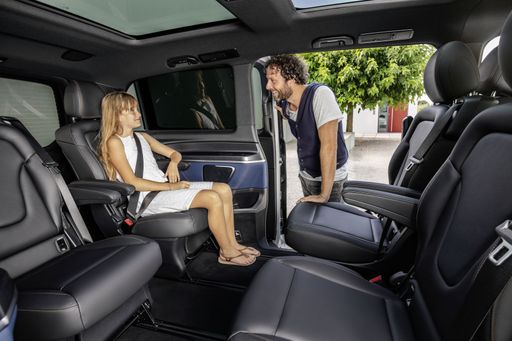 @ group-media.mercedes-benz.com
@ group-media.mercedes-benz.com

|

|
|
|
|
Costs and Consumption |
|
|---|---|
|
Price
39900 - 69100 £
|
Price
51300 - 54900 £
|
|
Consumption L/100km
7.9 - 10.3 L
|
Consumption L/100km
-
|
|
Consumption kWh/100km
21.3 - 32 kWh
|
Consumption kWh/100km
27.1 - 27.4 kWh
|
|
Electric Range
247 - 317 km
|
Electric Range
244 - 365 km
|
|
Battery Capacity
68 kWh
|
Battery Capacity
60 - 90 kWh
|
|
co2
0 - 270 g/km
|
co2
0 g/km
|
|
Fuel tank capacity
70 L
|
Fuel tank capacity
-
|
Dimensions and Body |
|
|---|---|
|
Body Type
Cargo Van
|
Body Type
Bus
|
|
Seats
3 - 6
|
Seats
6
|
|
Doors
4
|
Doors
5
|
|
Curb weight
2074 - 2765 kg
|
Curb weight
2666 - 2863 kg
|
|
Trunk capacity
-
|
Trunk capacity
1030 - 1410 L
|
|
Length
5531 - 6704 mm
|
Length
5140 - 5370 mm
|
|
Width
2059 mm
|
Width
1928 mm
|
|
Height
2530 - 2778 mm
|
Height
1920 - 1923 mm
|
|
Payload
735 - 2607 kg
|
Payload
637 - 834 kg
|
Engine and Performance |
|
|---|---|
|
Engine Type
Diesel, Electric
|
Engine Type
Electric
|
|
Transmission
Manuel, Automatic
|
Transmission
Automatic
|
|
Transmission Detail
Manual Gearbox, Automatic Gearbox
|
Transmission Detail
-
|
|
Drive Type
Front-Wheel Drive, Rear-Wheel Drive, All-Wheel Drive
|
Drive Type
Front-Wheel Drive
|
|
Power HP
105 - 269 HP
|
Power HP
204 HP
|
|
Acceleration 0-100km/h
-
|
Acceleration 0-100km/h
10.3 - 12.1 s
|
|
Max Speed
120 km/h
|
Max Speed
140 km/h
|
|
Torque
310 - 430 Nm
|
Torque
365 Nm
|
|
Number of Cylinders
4
|
Number of Cylinders
-
|
|
Power kW
77 - 198 kW
|
Power kW
150 kW
|
|
Engine capacity
1995 cm3
|
Engine capacity
-
|
General |
|
|---|---|
|
Model Year
2019 - 2024
|
Model Year
2024
|
|
CO2 Efficiency Class
G, A
|
CO2 Efficiency Class
A
|
|
Brand
Ford
|
Brand
Mercedes-Benz
|
Ford Transit Transporter
Discovering the Ford Transit Transporter: A Blend of Tradition and Innovation
The Ford Transit Transporter has long been a staple in the commercial vehicle market, known for its reliability and versatility. As Ford continues its innovative journey, the Transit Transporter integrates modern technology and eco-friendly advancements, making it more appealing than ever. Here, we explore some of its key technical details and innovations.
Under the Bonnet: Engine Variants and Efficiency
The Ford Transit Transporter offers a variety of engine options to cater to diverse commercial needs. Among these, the 2.0 EcoBlue Diesel engine provides a robust selection of power outputs, ranging from 105 to 165 PS. Not just limited to traditional fuel, Ford also introduces the E-Transit line with electric motors generating up to 269 PS. This transition to electric is an essential step towards sustainability, achieving an impressive range of 247 to 317 km on a full charge.
Fuel Economy and Environmental Impact
When it comes to fuel efficiency, the Transit Transporter presents a competitive edge with diesel variants consuming between 7.9 to 10.3 L/100km. On the electric side, consumption levels are measured at 21.3 to 32 kWh/100km. Furthermore, the Transit’s CO2 emissions range from zero for electric models to 270 g/km for select diesel engines, placing the vehicle in varying CO2 efficiency classes from G to A.
Performance and Driving Dynamics
Designed for optimal performance, the vehicle’s torque output ranges from 310 to 430 Nm, facilitating smooth and powerful driving experiences across various terrains. The Transit Transporter boasts a maximum speed of 120 km/h, ensuring timely commutes and deliveries, crucial for business efficacy.
The Versatility of Drivetrain Options
The Ford Transit Transporter provides an array of drivetrain configurations, including front-wheel, rear-wheel and all-wheel drive. This adaptability enables the vehicle to tackle different driving conditions with ease, offering stability and resilience no matter the challenge.
Technology and Innovation on Board
Ford’s commitment to innovation is evident within the Transit Transporter’s interior. Intuitive features such as advanced driver-assistance systems, smart connectivity tools, and ergonomic seating arrangements ensure that both driver and passengers enjoy a seamless and comfortable journey, ideal for long rides or daily routines.
Crafted for Practicality and Comfort
With length variations extending from 5531 mm to 6704 mm, and height options from 2530 mm to 2778 mm, the Ford Transit Transporter offers expansive cargo space and flexible seating arrangements. Depending on the variant, seating options range from 3 to 6 seats, catering to diverse passenger and cargo needs.
A Future-Ready, Cost-Effective Choice
Price tags for the Ford Transit Transporter range from €46,589 to €80,611, accommodating different budget requirements. With monthly operation costs calculated between €1430 and €1991, the Transit remains a financially viable option for businesses seeking reliability and efficiency.
Conclusion: An Unyielding Commitment to Excellence
The Ford Transit Transporter stands as a testament to Ford’s dedication to marrying tradition with progress. With its diverse range of powertrains, technological integrations, and practical design, it continues to lead the commercial vehicle segment, ready to meet the challenges of modern mobility and sustainability.
Mercedes EQV
Introduction to the Mercedes-Benz EQV
The Mercedes-Benz EQV is the latest addition to the luxury automotive lineup, offering a unique blend of sustainability, performance, and innovative design. This all-electric MPV (multi-purpose vehicle) is designed to cater to the demands of modern family life and business travel, making zero-emission driving a refined and effortless experience.
Performance and Efficiency
At the heart of all EQV models is a robust electric motor producing 204 PS, or 150 kW, which ensures responsive acceleration and a smooth driving experience. With the option of either a 60 kWh or 90 kWh battery capacity, the EQV offers an impressive range of between 244 to 365 kilometres on a single charge, depending on your chosen configuration.
The electric motor's torque of 365 Nm, combined with a state-of-the-art automatic transmission system, ensures seamless gear shifts and optimal energy efficiency. The EQV boasts a consumption of 27.1 to 27.4 kWh per 100 kilometres, making it one of the most efficient vehicles in its class.
Innovative Technology
Mercedes-Benz has equipped the EQV with cutting-edge technology to enhance both driver convenience and passenger comfort. The integrated MBUX (Mercedes-Benz User Experience) system is a highlight, offering voice control and a high-resolution display that keeps drivers connected and informed at all times.
Furthermore, the EQV features advanced driver assistance systems designed to enhance safety and ease of driving. These include Active Brake Assist, Attention Assist, and Crosswind Assist, creating an optimised driving experience regardless of road conditions.
Design and Comfort
The Mercedes-Benz EQV retains the sleek and luxurious design language that is synonymous with the brand. With a length ranging from 5140 to 5370 mm, a width of 1928 mm, and a height of up to 1923 mm, the EQV provides ample space for passengers and luggage, comfortably seating up to six passengers.
The interior is thoughtfully designed with premium materials and flexible seating arrangements, allowing for a rear-seat configuration that suits varied needs, whether for family outings or business commutes. The EQV also offers a spacious boot capacity of 1030 to 1410 litres.
Environmental Impact and CO2 Efficiency
As part of Mercedes-Benz's commitment to sustainability, the EQV has an impressive CO2 efficiency class of 'A'. With zero CO2 emissions during operation, it represents an environmentally-friendly alternative for those seeking luxury without compromise.
Conclusion
The Mercedes-Benz EQV combines luxury, performance, and sustainability, setting a new benchmark for electric vehicles in the MPV segment. Whether for family or business, its advanced technology, thoughtful design, and eco-friendly credentials make it a compelling choice for discerning drivers.
Which drive types are available for the Ford Transit Transporter?
Available as Front-Wheel Drive, Rear-Wheel Drive or All-Wheel Drive.
The prices and data displayed are estimates based on German list prices and may vary by country. This information is not legally binding.
